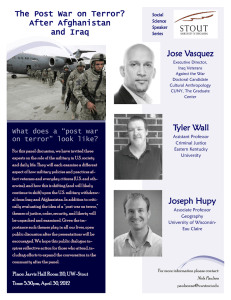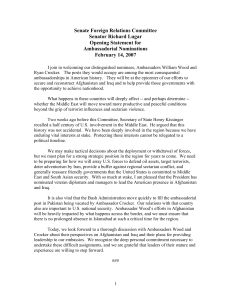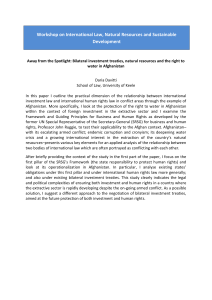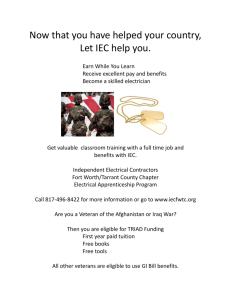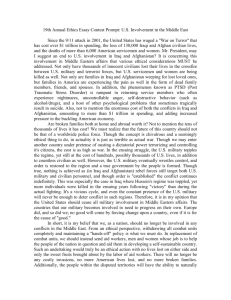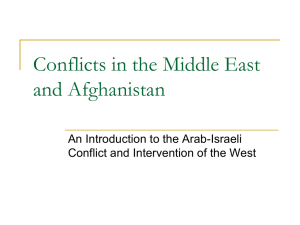OVERVIEW OF PROJECT FINDINGS Are the armed forces understood and supported by the public?
advertisement
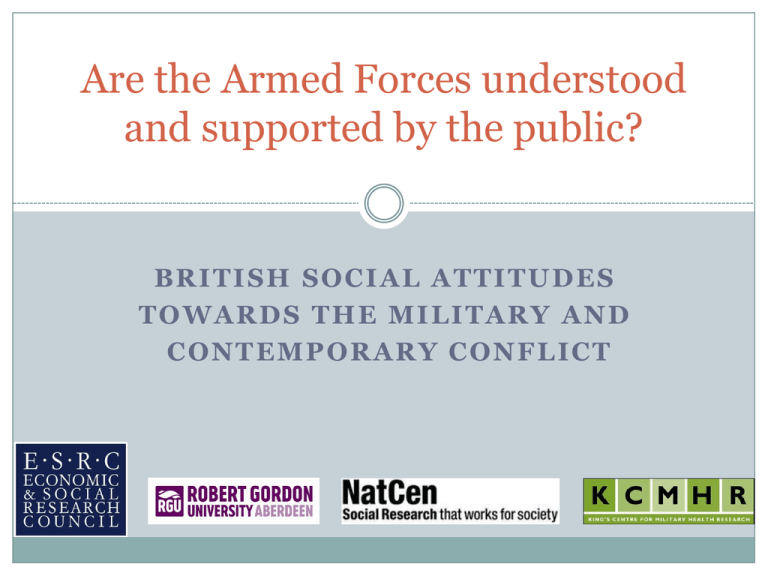
Are the Armed Forces understood and supported by the public? BRITISH SOCIAL ATTITUDES TOWARDS THE MILITARY AND CONTEMPORARY CONFLICT British Social Attitudes Survey 2011 BSA Survey 3,311 responded Response rate = 54% Data collection June to Sept 2011 bsa-29.natcen.ac.uk Public opinion of Iraq and Afghanistan Success of the missions 27% 30% Perceived purposes of Iraq Ensure Western oil supplies 26% Make Iraq a stable country 10% Protect UK from terrorism supported by Saddam 15% Other 11% Help US & NATO allies 12% Make ME more stable 8% Prevent Iraq acquiring WoMD 18% Perceived purposes of Afghanistan Other 6% Help US & NATO allies 13% Protect the UK from terrorism 30% Gain access to oil & mineral resources 14% Make Afghanistan a successful democracy 9% Make Afghanistan a stable country 28% British troops out now? Options for withdrawal from Afghanistan % As soon as possible, without conditions 35 As soon as the Afghan government can protect its territory AND prevent it from being used as a base for terrorism 34 As soon as the government in Afghanistan can protect its territory 19 As soon as Afghanistan has become a successful democracy/ AND has a successful economy 5 At a fixed future date, without conditions 4 Public opinion of the Armed Forces Role of the media Heroes or victims? Per cent % AF/ES more likely 100 80 60 77 58 59 Current personnel 57 51 46 40 24 15 20 0 Be respected Mental illness Suicidal tendencies Domestic violence Former members Veteran charities Almost 2/3 knew of veteran charity or organisation Two largest charities were the most well-known Royal British Legion & poppy charities Help for Heroes More than 75% had bought a Poppy Government support for veterans 100 Per cent % Yes 80 75 71 60 40 29 31 20 0 physical illness/ injury mental illness/ injury currently receive better health & welfare provision should get priority health & welfare provision Who is a veteran? Definitions % Left Service to retire 37 Deployed on operations (not necessarily overseas) 21 Deployed overseas in a combat mission 18 Unsure 9 Left Service after four years 9 Completed basic training 3 Deployed overseas 3 Completed a minimum of one day’s service 2 The UK civil-military gap 100 Per cent % Yes 80 69 Public 60 45 40 33 Armed Forces 31 20 20 2 0 Public support mission Military support returning personnel Reported hostility Future role of the UK Armed Forces % Defending the UK against threats from other states 28 Assisting police & security forces in anti-terror operations in the UK (incl. crime, terrorism and cyber security) 24 Supporting NATO allies, taking part in UN missions 17 Humanitarian aid & disaster relief (overseas or UK) 14 Missions against terrorists abroad 9 Protecting citizens of overseas countries who are engaged in protest or dissent from attacks by their government/rulers/ removing dictators 8 Ceremonial and public duties 1 Summary Public support UK Armed Forces but not missions Public believe military service to have an impact on mental health outcomes Public support priority government health & welfare services for veterans Differences between public and military opinions may have implications for civil-military relations Reluctance of public to support UK military action may be legacy of the Iraq and Afghanistan missions Further information Website: www.kcl.ac.uk/kcmhr Email: kcmhr@kcl.ac.uk Twitter: @kcmhr
